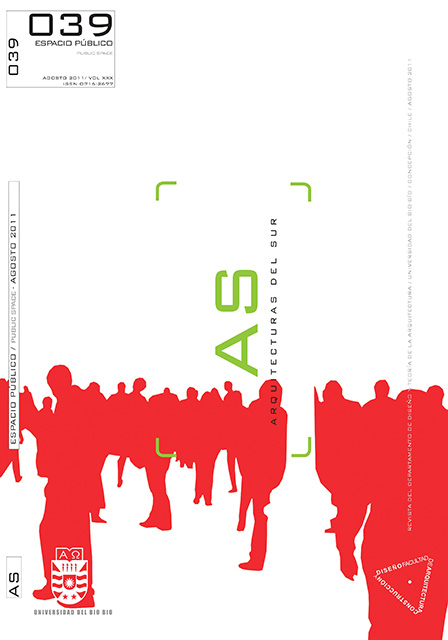Informal public space. Observations on the communal infrastructure and space in the squatter settlement of Pudeto Bajo in Ancud
Keywords:
informal public space, collective space, urban squatter settlements, infrastructure, workplacesAbstract
One little-addressed dimension of public space is that found in informal urban settlements, squatter settlements or slums. Here, public space is not only a socially shared place but also provides the functional infrastructure for survival mechanisms. In the settlement of Pudeto Bajo in Ancud the operational dimension of these public spaces linked to work activities or occupations -such as fishing, shared access to dwellings, storage of raw materials or fishing implements or just as playgrounds or simply places to play in or pass through- can be clearly appreciated. At the same time the larger-scale public spaces are at the edges, frontiers between the squatter settlement and the city, acting as buffers for often complex and even conflictive urban relationships. The role of these spatial categories is essential for the development of the settlement: on the one hand, indoor public spaces linked to work avoid the generation of unused and abandoned spaces, while on the other hand, public frontier spaces mediate to lessen the inherent tension between the informal aspects of urban production and the formal or planned city.
Downloads
Downloads
Published
How to Cite
Issue
Section
License
The content of the articles published in each issue of Arquitecturas del Sur is the sole responsibility of the authors and does not necessarily represent the opinion of University of the Bío-Bío.
The authors will maintain their copyright; however, they will guarantee the journal the right to first publication and dissemination of their work. The publication of the article in Arquitecturas del Sur will be subject to the Creative Commons International license (CC BY-SA) that allows others to adapt: remix, transform and build on the material for any purpose, even commercially; share: copy and redistribute the material in any medium or format, as long as the authorship and first publication in this journal are acknowledged by citing them correctly, and their new contributions are under a license with the same terms.














 Programa de Información Científica/Concurso Fondos de Publicación de Revistas Científicas 2018/ Proyecto Mejoramiento de Visibilidad de Revistas UBB (Código:FP180007)
Programa de Información Científica/Concurso Fondos de Publicación de Revistas Científicas 2018/ Proyecto Mejoramiento de Visibilidad de Revistas UBB (Código:FP180007) 
